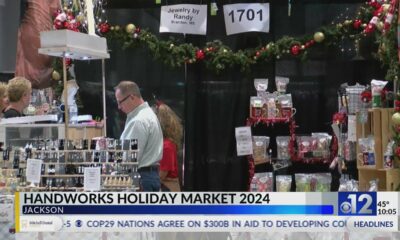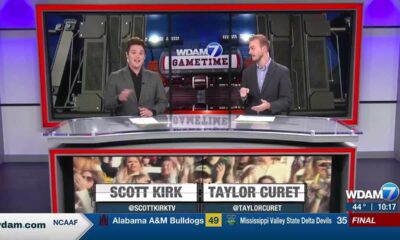Mississippi Today
Buses, notaries and strolls to the polls: How Mississippi college students are overcoming the nation’s toughest barriers to the ballot box

In 2016, Jarrius Adams’ absentee ballot never arrived at his apartment in Oxford, so the then-19-year-old at the University of Mississippi was left with one option to vote: Skip all his classes and drive four hours home to his polling place in Hattiesburg.
Faced with a similar situation, the reality is most college students would decide not to vote, said Adams, who now works with the nonprofit Mississippi Votes.
“For some students, it’s just as simple as eating three times a day now that you have no supervision,” he said. “To add voting for the first time?”
It can be hard to cast a ballot in Mississippi, where state voting laws consistently rank as among the strictest in the nation.
But for the state’s tens of thousands of college students — many of whom are voting for the first time while also trying to stay on top of homework, classes, chores and having a social life — the barriers to the ballot box faced by all Mississippi voters pose an even greater challenge.
Mississippi is one of just three states without early voting. This means college students who choose to vote in person most likely have just one day to get to the polls, which are not always on campus. According to a list provided by the Secretary of State’s office, three of the eight public universities in Mississippi lack an on-campus polling location for this election.
When college students turn 18 in Mississippi, they are not automatically registered to vote if they have a driver’s license, a law on the books in 23 other states. There’s no same-day voter registration, which voting experts say can pose an issue for college students whose addresses, and therefore precincts, change more often than other voters. And Mississippi doesn’t have online voter registration for new applicants.
Mississippi “pretty much has all the things that make it hard to vote,” said Jennifer McAndrew, the senior director of strategic communications for Tisch College at Tufts University, which houses the National Study of Learning, Voting and Engagement.
Nevertheless, colleges and students who have been working all semester long to encourage their peers to vote say that young Mississippians pursuing higher education are motivated to turn out this Election Day.
“Our young Mississippians are the future of our state,” Secretary of State Michael Watson, who has visited colleges across the state to talk to students about voting, said in a statement. “It is important for them to educate themselves not just on the voting process, but also the policies and issues affecting the state and nation..”
At Ole Miss this semester, the Center for Community Engagement has registered more students to vote before the deadline in an election year than it ever has before: About 350 students, according to William Teer, the program director for student leadership programs and financial well-being.
Now, it’s just a matter of getting these students to the polls.

“Everyone hears about how young people and college students in particular don’t vote in huge numbers for whatever reason,” said Marshall Pendes, a senior math and economics major who serves as a voting ambassador at Ole Miss. “I get a chance as a student to try and change that.”
Pendes cited a study that Tufts’ National Study of Learning, Voting and Engagement conducted of student voting at Ole Miss, which found that about 15,000 students — more than 75% of campus — were registered to vote during the last presidential election.
That’s in part because of the efforts of voting ambassadors like Pendes. In his four years at the university, Pendes estimated he’s helped register more than 600 students. He’s helped students complete the Mississippi Secretary of State’s paper registration application all across campus, at fraternities and sororities, before and after class, during student government meetings, in the Circle and at meetings for all kinds of political clubs.
But not so much on in the Grove.
“During games, people aren’t really interested in doing paperwork,” Pendes said.
The goal is to educate students on how, where and why it’s important to vote, Pendes said, whether that’s in-person in the county where they attend school or at home through an absentee ballot.
“One of the great things about voting as a college student is you have so many choices,” he said. “Every person’s situation is different.”
Even though college students qualify for an absentee ballot in Mississippi, students say it’s far more common for their peers to register to vote in their college’s county.
“It’s more common for students to register on campus,” said Avantavis TyMon, an elementary education major at Alcorn State University who is also a Mississippi Votes’ Democracy in Action fellow. “It’s easier, and it’s more accessible … especially for the out-of-state students who don’t have cars.”
Alcorn State University is one of five public universities that will host on-campus precincts this year, along with Mississippi Valley State University, Mississippi State University, the University of Southern Mississippi and Jackson State University.
Though Delta State University does not have an on-campus voting location, there is a precinct across the street.
On Election Day, TyMon said he and other student leaders plan to canvass the dorms and ask students if they want to join a “stroll to the polls” event, which will involve a short walk to the on-campus precinct.
“It’s a little bit of a walk from where students live,” TyMon said, adding that in previous years, “we would meet up and all walk together.”
Mississippi’s absentee ballot process, which experts describe as onerous, may be another reason college students register to vote in-person in greater numbers.
“It is an unbelievable barrier for college students who don’t live in Mississippi or are voting absentee in Mississippi,” McAndrews said.
First, a voter must request an absentee ballot application from their circuit clerk’s office, according to a step-by-step guide from the Mississippi Secretary of State’s office. Once they receive the application in the mail, the voter must have it witnessed by a notary, unless they are disabled. When a voter gets a ballot, the next step is finding another notary to watch the voter fill it out.
“You can do your taxes in one day,” Adams said. In Mississippi, “you cannot vote by mail in one day.”
Even some notaries think Mississippi’s absentee ballot law could be eased.
Bill Anderson, the vice president of government affairs at the National Notary Association, said that, of the handful of states that involve notaries in the process, Mississippi’s law is the strictest.
“You’d expect us to be supportive of states that allow or create a role for notaries in absentee ballots,” Anderson said. “We think this is a good idea. … These states, including Mississippi, want there to be a layer of security that is absent for voters voting absentee.”
Nonetheless, Anderson said he is hoping to work with Mississippi lawmakers next year on some issues he sees with what he called the “non-notarial functions” required by the state’s law.
For instance, Mississippi’s law requires notaries to sign the back of the envelope containing the voters’ ballot, something Anderson said is not expressly permitted by the notary laws of his home state in California. And Mississippi doesn’t oblige notaries to affix their seal to the envelope, which Anderson said other states require notaries to do.
“You can just imagine the poor voter,” Anderson said. “They’re out here, and the California notary is trying to find their state law and doesn’t want to get in trouble with the Secretary of State of California and says look … I’d love to do this for you, but I can’t.”
For his part, Pendes said he thinks students who want to vote absentee are motivated to find notaries, which can be relatively easy to do on a college campus.
“In my experience, people usually aren’t defeated by the notarization part,” he said.
At Mississippi State, the student government association and the Division of Student Affairs held an event called “Notary Day” last week. More than 70 students had their absentee ballots notarized, said Carson McFatridge, the student association president.
“When I think of a notary, I think of someone at the bank,” she said. “That can be a challenge just not knowing who has the capability to do that … so it was really, really cool to be able to see people like our dean of students volunteer an hour of his time to sit out there and help people.”
McAndrew said it’s important for colleges to make voting as a student as simple as possible, because even the perception that voting is complicated is itself a barrier.
“There’s so much out there about strict voter ID laws, it becomes this ghost barrier on top of the actual barrier,” McAndrew said.
“Anything we can do not only to reduce the complexity but to reduce the intimidation and anxiety factor is really important,” she added.
To that end, many professors have canceled classes to give students the day off to vote, and universities across the state are offering rides to the polls. At Ole Miss, buses will leave from the Walk of Champions and behind Ole Miss Bike Shop from 7 a.m. to 7 p.m. on Election Day.
This does more than help students without cars, Pendes said.
“The other thing to consider is that parking spaces on our campus are extremely hard to come by,” he said. “Do you want to move your car and lose your parking space to try to go vote? Because that isn’t necessarily something that’s always guaranteed to you, especially in commuter spaces.”
This semester, the Center for Community Engagement was also successful in finding a solution to an issue that has troubled student voters for years at Ole Miss, which is that residence halls and Greek Life houses are not considered acceptable mailing addresses at which to register.
Teer, the program director, said he worked with the Lafayette County Circuit Clerk’s office to establish the center as a mailing address for students who live on campus.
“We’ve had students coming in daily because they’ve received an email from us that their voter information cards had arrived,” Teer said.
Every Thursday, students at Alcorn State held a voter registration event at the campus chapel. TyMon also helped organize a voter registration block party that featured food trucks. These efforts resulted in more than 400 students registering to vote.
TyMon said he thinks student leaders have an important role to play in setting an example for their peers.
“When they see that we’re serious, they get serious,” he said.
That’s why A’Davion Bush, a sophomore political science major at Ole Miss, is going to drive home to Indianola not just to vote, but to volunteer at the polls. The Mississippi Votes’ Democracy in Action fellow said he’s going to post about his plan on social media so his friends who are still in high school will be inspired to vote when they turn 18.
“The older population is not doing anything to influence young people in my county,” he said.
McFatridge, the student body president at Mississippi State, said she recently registered a student to vote who had just become a U.S. citizen, which reminded her that while voting is a right, it’s also a privilege not had by everyone around the world.
Not voting in the U.S. is “kind of like looking a gift horse in the mouth,” McFatridge said.
“It’s a silly phrase,” she added, “but I truly believe that when given the opportunity to share your own thoughts and beliefs, I don’t know why you wouldn’t.”
An Arkansan, McFatridge had intended to vote early in her hometown of Searcy during fall break, but a family emergency prevented that.
It’s too late for her to order an absentee ballot, so now she’s driving home to vote before Election Day, 4.5 hours away.
This article first appeared on Mississippi Today and is republished here under a Creative Commons license.![]()
Mississippi Today
An ad supporting Jenifer Branning finds imaginary liberals on the Mississippi Supreme Court

The Improve Mississippi PAC claims in advertising that the state Supreme Court “is in danger of being dominated by liberal justices” unless Jenifer Branning is elected in Tuesday’s runoff.
Improve Mississippi made the almost laughable claim in both radio commercials and mailers that were sent to homes in the court’s central district, where a runoff election will be held on Tuesday.
Improve Mississippi is an independent, third party political action committee created to aid state Sen. Jenifer Branning of Neshoba County in her efforts to defeat longtime Central District Supreme Court Justice Jim Kitchens of Copiah County.
The PAC should receive an award or at least be considered for an honor for best fiction writing.
At least seven current members of the nine-member Supreme Court would be shocked to know anyone considered them liberal.
It is telling that the ads do not offer any examples of “liberal” Supreme Court opinions issued by the current majority. It is even more telling that there have been no ads by Improve Mississippi or any other group citing the liberal dissenting opinions written or joined by Kitchens.
Granted, it is fair and likely accurate to point out that Branning is more conservative than Kitchens. After all, Branning is considered one of the more conservative members of a supermajority Republican Mississippi Senate.
As a member of the Senate, for example, she voted against removing the Confederate battle emblem from the Mississippi state flag, opposed Medicaid expansion and an equal pay bill for women.
And if she is elected to the state Supreme Court in Tuesday’s runoff election, she might be one of the panel’s more conservative members. But she will be surrounded by a Supreme Court bench full of conservatives.
A look at the history of the members of the Supreme Court might be helpful.
Chief Justice Michael Randolph originally was appointed to the court by Republican Gov. Haley Barbour, who is credited with leading the effort to make the Republican Party dominant in Mississippi. Before Randolph was appointed by Barbour, he served a stint on the National Coal Council — appointed to the post by President Ronald Reagan who is considered an icon in the conservative movement.
Justices James Maxwell, Dawn Beam, David Ishee and Kenneth Griffis were appointed by Republican Gov. Phil Bryant.
Only three members of the current court were not initially appointed to the Supreme Court by conservative Republican governors: Kitchens, Josiah Coleman and Robert Chamberlin. All three got their initial posts on the court by winning elections for full eight-year terms.
But Chamberlin, once a Republican state senator from Southaven, was appointed as a circuit court judge by Barbour before winning his Supreme Court post. And Coleman was endorsed in his election effort by both the Republican Party and by current Republican Gov. Tate Reeves, who also contributed to his campaign.
Only Kitchens earned a spot on the court without either being appointed by a Republican governor or being endorsed by the state Republican Party.
The ninth member of the court is Leslie King, who, like Kitchens, is viewed as not as conservative as the other seven justices. King, former chief judge on the Mississippi Court of Appeals, was originally appointed to the Supreme Court by Barbour, who to his credit made the appointment at least in part to ensure that a Black Mississippian remained on the nine-member court.
It should be noted that Beam was defeated on Nov. 5 by David Sullivan, a Gulf Coast municipal judge who has a local reputation for leaning conservative. Even if Sullivan is less conservative when he takes his new post in January, there still be six justices on the Supreme Court with strong conservative bonafides, not counting what happens in the Branning-Kitchens runoff.
Granted, Kitchens is next in line to serve as chief justice should Randolph, who has been on the court since 2004, step down. The longest tenured justice serves as the chief justice.
But to think that Kitchens as chief justice would be able to exert enough influence to force the other longtime conservative members of the court to start voting as liberals is even more fiction.
This article first appeared on Mississippi Today and is republished here under a Creative Commons license.![]()
Mississippi Today
On this day in 1968


Nov. 24, 1968

Black Panther leader Eldridge Cleaver fled the U.S. to avoid imprisonment on a parole violation. He wrote in “Soul on Ice”: “If a man like Malcolm X could change and repudiate racism, if I myself and other former Muslims can change, if young whites can change, then there is hope for America.”
The Arkansas native began to be incarcerated when he was still in junior high and soon read about Malcolm X. He began writing his own essays, drawing the praise of Norman Mailer and others. That work helped him win parole in 1966. His “Soul on Ice” memoir, written from Folsom state prison, described his journey from selling marijuana to following Malcolm X. The book he wrote became a seminal work in Black literature, and he became a national figure.
Cleaver soon joined the Black Panther Party, serving as the minister of information. After a Panther shootout with police that left him injured, one Panther dead and two officers wounded, he jumped bail and fled the U.S. In 1977, after an unsuccessful suicide attempt, he returned to the U.S. pleaded guilty to a reduced charge of assault and served 1,200 hours of community service.
From that point forward, “Mr. Cleaver metamorphosed into variously a born-again Christian, a follower of the Rev. Sun Myung Moon, a Mormon, a crack cocaine addict, a designer of men’s trousers featuring a codpiece and even, finally, a Republican,” The New York Times wrote in his 1998 obituary. His wife said he was suffering from mental illness and never recovered.
This article first appeared on Mississippi Today and is republished here under a Creative Commons license.![]()
Mississippi Today
On this day in 1867


Nov. 23, 1867

The Louisiana Constitutional Convention, composed of 49 White delegates and 49 Black delegates, met in New Orleans. The new constitution became the first in the state’s history to include a bill of rights.
The document gave property rights to married women, funded public education without segregated schools, provided full citizenship for Black Americans, and eliminated the Black Codes of 1865 and property qualifications for officeholders.
The voters ratified the constitution months later. Despite the document, prejudice and corruption continued to reign in Louisiana, and when Reconstruction ended, the constitution was replaced with one that helped restore the rule of white supremacy.
This article first appeared on Mississippi Today and is republished here under a Creative Commons license.![]()
-

 Kaiser Health News6 days ago
Kaiser Health News6 days agoA Closely Watched Trial Over Idaho’s Near-Total Abortion Ban Continues Tuesday
-

 Local News5 days ago
Local News5 days agoSherral’s Diner to be featured on America’s Best Restaurants
-

 Local News2 days ago
Local News2 days agoIntroducing our Student Athlete of the Week: Ocean Springs’ very own Mackenzie Smith
-

 News from the South - Georgia News Feed4 days ago
News from the South - Georgia News Feed4 days agoJose Ibarra found guilty in murder of Laken Riley | FOX 5 News
-

 News from the South - Alabama News Feed5 days ago
News from the South - Alabama News Feed5 days agoTrial underway for Sheila Agee, the mother accused in deadly Home Depot shooting
-

 News from the South - Kentucky News Feed4 days ago
News from the South - Kentucky News Feed4 days agoNicholasville organization activates weather plan in response to bitter cold temperatures
-

 News from the South - Alabama News Feed4 days ago
News from the South - Alabama News Feed4 days agoJudge grants mistrial in Sheila Agee trial due to ‘unhinged juror’
-

 News from the South - Alabama News Feed5 days ago
News from the South - Alabama News Feed5 days agoAlabama's weather forecast is getting colder, and a widespread frost and freeze is likely by the …



























